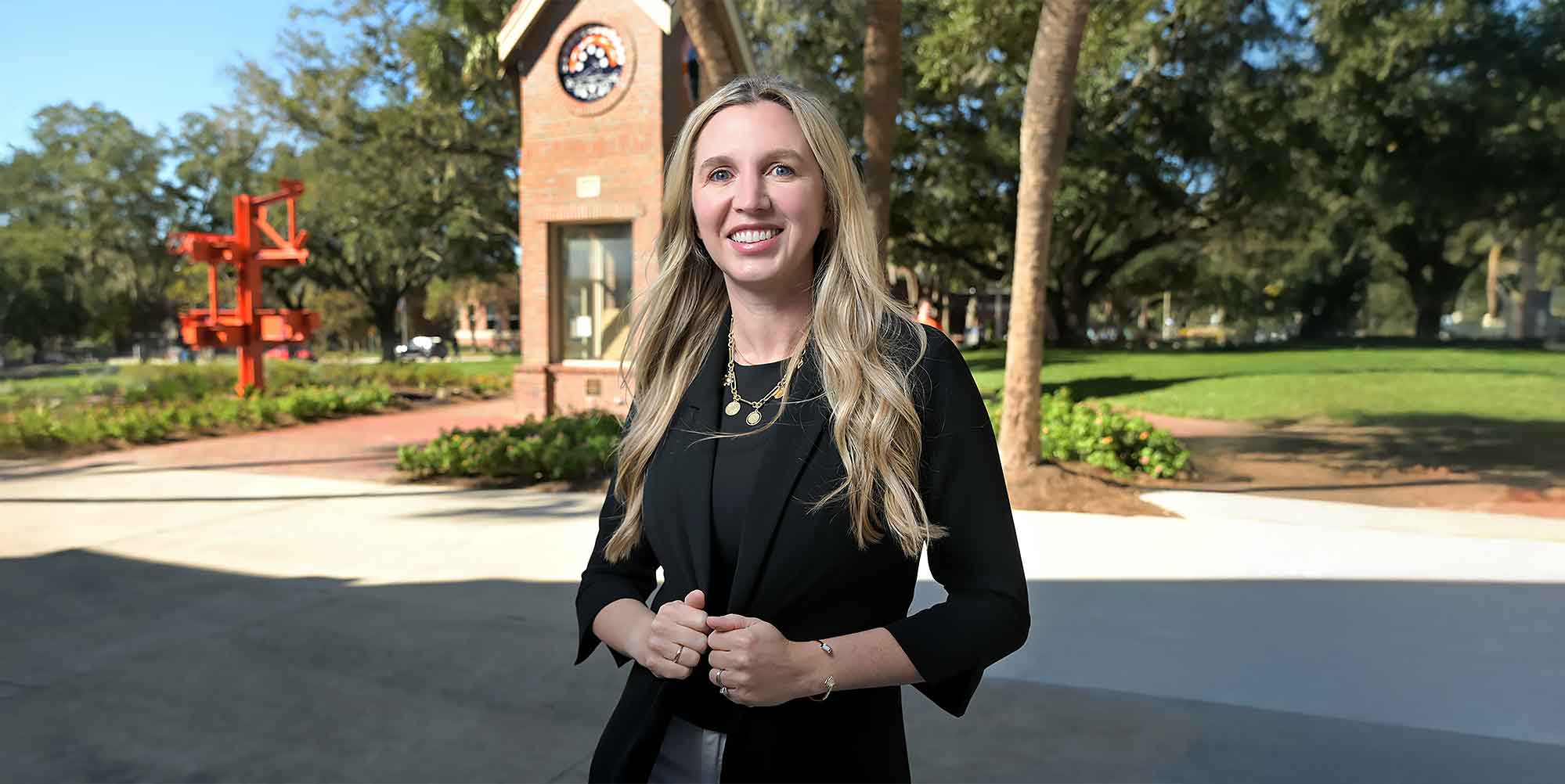Growing up in Johnstown, Pennsylvania, Andrea Goncher Sevilla, Ph.D., wanted to be a veterinarian.
“But eventually I realized the job was not getting to play with healthy animals all day,” said Goncher Sevilla, an instructional associate professor with the University of Florida’s Department of Engineering Education (EEd). “So after taking more science and math classes and job-shadowing environmental engineers, I wanted to be an engineer.”
Good call.
She joined the EEd faculty in 2019 and teaches human-centered design and systems engineering; her research areas are engineering education and text analytics.
But she is also known as the faculty lead for the department’s student peer-mentoring program.
“Our peer mentors are typically engineering students who have taken the Engineering Design and Society course and have returned to guide new teams with project-based work, 3D-printing, microelectronics and empathy-driven design,” she said. “I work with the peer mentors to support faculty-led makerspace labs, facilitate workshops that help students develop skills — including soldering, 3D-printing and other fabrication methods — and create designs that demonstrate the possibilities of microelectronics in society.”
Her impact on EEd extends well beyond peer mentoring, colleagues contend.
“Working with and witnessing Andrea’s contributions to engineering education research, human-centered design and multiple student projects has made me appreciate her versatility in leadership and reach,” said EEd Chair Idalis Villanueva Alarcón, Ph.D.
“Working with Andrea on multiple conference papers since we created our small Systems Thinking Lab has been one of the most rewarding collaborations of my academic career,” added EEd Graduate Coordinator and Instructional Associate Professor John Mendoza-Garcia, Ph.D. “Her writing is not only clear and compelling, it elevates the entire project.”
Here is more on Goncher Sevilla, one of EEd’s most versatile leaders.
What are the advantages of peer mentoring?
A learning community that extends beyond the typical classroom, where students learn from and with each other. Mentors get work experience that supports additional skill/technical development and facilitates professional identity and confidence. Mentors help the students see how they can apply the skills learned in this class to other classes and internships.
I love seeing what our peer mentors do after working with our course or graduating. I talk to employers, who ask about how the potential candidate/peer mentor works in team environments, approaches unstructured problems, troubleshoots shoots and communicates with others. The employers are always impressed with the experiences and professional skills our peer mentors have from working with faculty and students at UF in the makerspace and in project-based learning environments.
What is your interest in peer mentoring?
It grew out of working closely with undergraduate and graduate students in project-based and research environments, including capstone design, Research Experiences for Undergraduates, Ph.D. and master’s projects. I’ve mentored for undergraduates during their industry co-op placements, helping them bridge the gap between classroom theory and real-world engineering practice. We’re really lucky to have peer mentor support for the freshman design program.
How did you find your way to UF?
I was a faculty member at an Australian university and was working with Engineers Without Borders Australia. My teaching and research work focused on human-centered design in global contexts. UF advertised a faculty position to teach engineering design in societal contexts and conduct research in engineering education. The position was an amazing fit for my career goals and an opportunity to work with colleagues I knew from the engineering education community. I also grew up spending my summers in Florida and trying to convince my parents to move here.
What sparked your interest in engineering?
Physical science and physics classes, workshops and summer camps helped me understand how fundamental and ubiquitous engineering is to make the world work. I also got to see what professional engineers “do” and the impacts they have on the environment and people. I wanted to be part of the reason people have clean drinking water or have structures that protect us from environmental hazards or have the infrastructure, processes and products for people with disabilities.
Introduce us to your family.
My husband, Kevin, is a chess coach and engineer. We have a 1-year-old son, Mateo, and a dog named Georgy.
What do you and your family enjoy doing?
Going to the beach and being on the water. I love Gainesville because you can spend time outside at parks or on trails, find live music and be part of college-town atmosphere, especially during Gator football and basketball seasons.
What pop culture are you consuming these days?
I’m always looking for good music and interesting playlists for my son to listen to and avoid screen time. Right now, we enjoy dancing to Bad Bunny and “K-Pop Demon Hunters.” I’m also trying to transfer my piano-playing skills and learn how to play the accordion.

